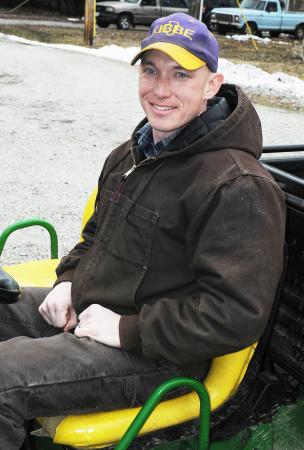WIU Introduces Alumnus as New Kibbe Field Station Manager
February 28, 2020
MACOMB, IL – When Neil Gillespie became the new field station manager at Western Illinois University's Kibbe Field Station near Warsaw, IL recently, there wasn't much of a learning curve.
The WIU alumnus had studied at Kibbe during work for both of his degrees, and had worked there while he was employed with the United States Geological Survey (USGS). Gillespie received his bachelor's (2010) and master's (2018) degrees from WIU, both in biology.
"My first visit was in 2007 as part of a general ecology class; we came here for the weekend to do sampling," said Gillespie. "It was such a cool experience. At the time, I had no idea Kibbe was even here."
Throughout his time doing research at the field station, Gillespie worked with turtles and in the fisheries area.
"I did research here and had summer jobs at the station, doing trail maintenance and keeping the place clean," he said. "I knew the place well."
While working with the U.S. Fish and Wildlife Service (USFWS), Gillespie worked in southern Illinois for more than three years. Knowing his position there would end within one year, Gillespie happened upon the job listing of managing Kibbe.
"My wife and I spent 10 years in Macomb," he said. "I applied and received an offer; I didn't think twice about it."
Gillespie said he hopes to continue the work and research done by former field station manager Jim Lamer, who is now director of the Illinois River Biological Station for the Illinois Natural History Survey. Lamer continues at WIU as adjunct faculty to help his graduate students finish their academic work.
"I would love to have continued fisheries research – this location is just perfect for it and we have all of the equipment needed for sampling," Gillespie said.
Other programs Gillespie would like to continue at Kibbe are bringing veterans to the field station for time on the Mississippi River and having scouting troops stay and explore.
He would also like to see the active fire program expanded at Kibbe to control invasive plant species, which serve as a fire hazard. During his academic journey, Gillespie became interested in using fire as a management tool and continued his training to become a wildland firefighter while he was employed by the U.S. Fish and Wildlife Service. He served several tours of duty battling fires in the western United States.
"We served two weeks at a time, with 12- to 16-hour days," he said. "I studied the ecology of fire and how to safely use fire as a management tool."
Gillespie's biggest goal for Kibbe is to raise awareness of what the field station has to offer and "get as many people out here as possible."
"I want to get the word out that we're here," he said. 'We have 12-14 miles of hiking trails that are open to the public. My first job with the USGS was working out of this station. My time here set me up to be a fish biologist and my background allowed me to get this job. All of this combined to help bring me back here."
The Alice L. Kibbe Life Science Station is located in Hancock County, just on the north edge of Warsaw, IL. Kibbe donated the initial 115 acres to WIU in 1964. The University later purchased adjoining property that offers access to the Mississippi River, a bald eagle habitat and endless biological research opportunities to WIU students and faculty.
The Illinois Department of Natural Resources owns nearly 1,500 acres next to the Kibbe property that makes up the Cedar Glen Natural Area and Sand Hills Nature Preserve.
Gillespie lives on the property, which also has several storage buildings and a large multi-purpose facility, opened in 2004, that offers meeting and dormitory space in an environmentally-friendly building.
The station is directed by WIU Biology Professor Sean Jenkins, who called Gillespie an "excellent addition" to Kibbe.
"He brings a great deal of natural resource management and large river research/management experience to the position," said Jenkins.
For more information about the Kibbe Field Station, visit wiu.edu/kibbe.
Posted By: Jodi Pospeschil (JK-Pospeschil@wiu.edu)
Office of University Communications & Marketing


Connect with us: